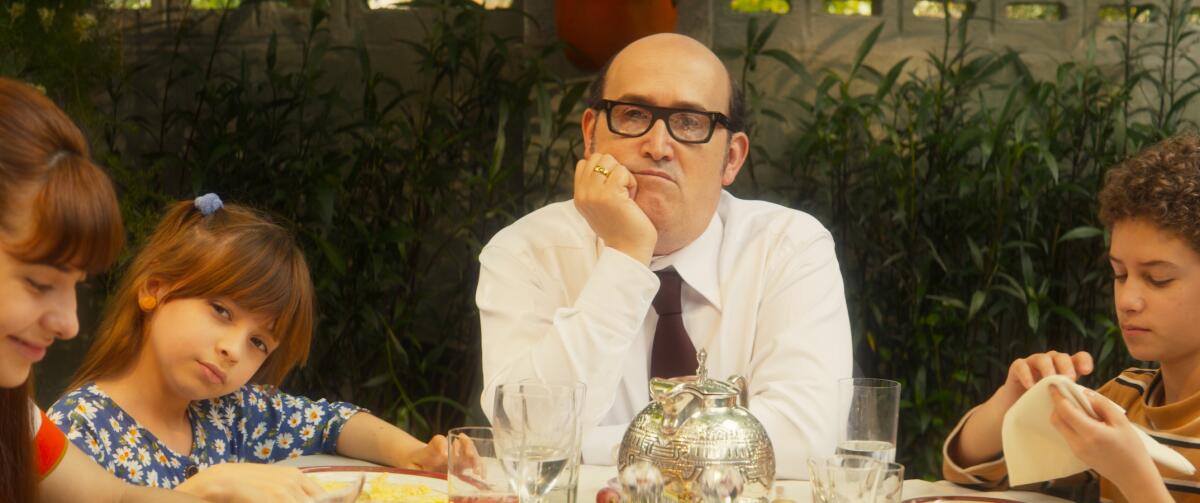Sentimental ‘Memories of My Father’ presents disjointed portrait

- Share via
The life of late Colombian doctor, professor and human rights defender Héctor Abad Gómez was certainly singular enough to be recollected in print and, to wit, “Oblivion. A Memoir,” by Gómez’s son, Héctor Abad Faciolince, became a prize-winning bestseller.
But making a film based on said book is another matter and the result, “Memories of My Father,” may have benefited from a far more telescoped, narratively engaging approach than was taken by screenwriter David Trueba and his brother, director Fernando Trueba (Oscar-winning “Belle Époque,” “Calle 54”).
For your safety
The Times is committed to reviewing theatrical film releases during the COVID-19 pandemic. Because moviegoing carries risks during this time, we remind readers to follow health and safety guidelines as outlined by the CDC and local health officials.
In addition, telling Gomez’s story largely through the adoring eyes of 12-year-old Hector Jr., nicknamed “Quiquin” (Nicolás Reyes Cano), lends too much of the movie a kind of one-note quality, more hagiography than objectively dimensional character study.
True, Gómez (Javier Cámara) appeared to be an amazingly affectionate, embracing and devoted family man, the kind of dad — and spouse — everyone hopes for. And, as someone who clearly felt and believed in things on a profoundly deep level, there’s no dearth of emotional resonance to his character here.
But too much of the film (an official selection at 2020’s Cannes Film Festival and Colombia’s entry in the 2021 Oscar race) lacks sufficient conflict and an organic sense of storytelling. Flashing back from 1983 Italy, where 24-year-old Hector Jr. (Juan Pablo Urrego) is studying literature, to his relatively idyllic childhood in Medellín, Colombia, circa 1971, the film plays like a series of snapshots; “memories” that fill a canvas — and the film’s inflated running time — but don’t necessarily add up to a propulsive, unique or absorbing enough story.
These rearview-mirror episodes feature such bits as Hector Sr. taking his young son to a “serious” movie that bores the kid into slumber, Hector Jr. breaking a Jewish neighbor’s window out of knee-jerk antisemitism, and the boy’s desire to see a corpse in his dad’s research lab (and a subsequent nightmare about it). Even when there are the briefest payoffs to some of these and other disconnected scenes, they play like little more than filler.
A 1980s sequence in which the adult Hector Jr. near-fatally runs over a pedestrian proves startlingly inconsequential — and a tad ambiguous.
More compelling are the warm and lively group portrayals of Hector Jr.’s tight-knit family, which includes his luminous mother, Cecilia (Patricia Tamayo), and four sisters (three older and one younger). A bossy nun, a loyal housekeeper and Quiquin’s ailing grandma are household fixtures as well.
Still, these characters tend to fall into the general swirl instead of making fully individual, organic impressions. The exception is Hector Jr.’s musical, if ill-fated sister, Marta (Kami Zea), whose soulful renditions of the Rolling Stones’ “Ruby Tuesday” provide several evocative moments.
The heft of the story (and what made Hector Sr. such a notable, memoir-worthy persona) involves the doctor’s unflagging and quite public commitment to progressiveness — medical, social and political — which branded him as a “Communist” and “Marxist” in a country increasingly plagued by drug-related and paramilitary violence. But even the uninitiated will likely guess Hector Sr.’s fate — he’s portrayed as too saintly a man to escape earthly retribution — if not the overly melodramatic way the film plays out.
In addition to a wonderfully vivid turn by Cámara (a veteran of such Pedro Almodóvar films as “Talk to Her” and “Bad Education”), the cinematography by Sergio Iván Castaño is also a plus. Stark black-and-white imagery is employed for the 1980s sequences and warm color for the 1970s scenes, a provocative twist on the typical use of black and white for flashbacks.
If only the rest of this well-intended, if overly sentimental journey was as intriguing.
'Memories of My Father'
In Spanish, Italian and English with English subtitles.
Not rated
Running time: 2 hours, 16 minutes
Playing: Starts Nov. 25 Laemmle Royal Theatre, West Los Angeles; Laemmle Town Center 5, Encino
More to Read
Only good movies
Get the Indie Focus newsletter, Mark Olsen's weekly guide to the world of cinema.
You may occasionally receive promotional content from the Los Angeles Times.









